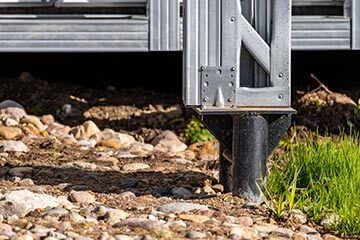There's a lot to consider when you're thinking of selling your home - one of these is working out how to value your house. The best and most accurate way to find out your home's value is to ask an estate agent or surveyor.
You might need to know how much your house is worth to get a home insurance quote. If this is the case, there are other things you can do to get a faster valuation.
Here's a handy guide to valuing your home.

What factors influence my home's market value?
The market value of your home depends on several factors including:
- Location
- The size and layout of the house
- The age of the home. For example, older houses could be listed buildings
- Crime rates - you can find these on the Police.uk crime mapping website
- Flood risk - you can check for England and Wales, Scotland, and Northern Ireland
- If the house suffers from subsidence
- Distance to local amenities
- School catchment areas
- Good transport links
- The condition and upkeep of the house
What's the difference between market value and rebuild cost?
Your home's rebuild cost is the amount of money it would take to completely rebuild your home after a disaster like a fire or a flood. This is the cost to cover materials and labour costs only. When you get a home insurance quote, we'll estimate this for you.
Your home's market value also considers wider factors like desirability, local amenities and crime rates. If you've just bought your house, its value is what you paid for it.
When you get a home insurance quote, you should expect your home's value to be more than its rebuild cost.
How do I find out the value of my house?
1. Find houses that are sold near you
It's a good idea to look online at how much other houses in your area have sold for. Services like Zoopla can give you an approximate figure for the value of your home.
Just enter your postcode and select 'search'. You should then see homes in your area along with:
- When they were last sold
- How much they sold for
- The current estimated value
This gives you a rough idea of your home's value. Unless the houses nearby have sold recently, you can't get a completely accurate value.
2. Look at price trends by your area and nationally
It’s also worth looking at how the housing market is doing across the country.
The Land Registry's report is probably the most reliable house price index as it's based on actual sales. You can filter by:
- Property type - Detached, semi-detached, terraced houses, flats and maisonettes
- Area - By country, region, county and local authority
- Date - You can go as far back as January 1995
You should be able to see average national house prices as well as the:
- Annual percentage change in house price
- Monthly percentage in house price
- Number of properties being sold - both new builds and existing properties
3. Use a house value calculator
If you’re looking for a rough estimate of your home value, you can access a free house price calculator online such as:
- Zoopla
- Rightmove
- The Land Registry's calculator
- Property Price Advice
- Mouseprice
Most of these services require you to register before you can see your property's value.
4. Look at local asking prices
Local asking prices can indicate how much you could get for your house if you sold it today, and also how many properties are sold on a regular basis.
Remember to use a few different sources to get the best idea of the local housing market.
5 . Get an estate agent or surveyor to value your house
You're going to get the most accurate valuation from an estate agent. Try and get a few of these to get a good idea of the value.
Estate agents should provide you with the valuation for free, provided you're thinking of selling your property. If you decide to hire a surveyor, they're likely to charge you to do an accurate valuation of your home.
How does my home's value affect my home insurance costs?
The value of your home is just one of several factors that impact your home insurance costs. And many of the factors that influence your home's market value also impact your home insurance costs, including:
- Rebuild costs
- Risk of burglary
- Risk of flooding
- History of subsidence
- Number of bedrooms
- Age
"A house with a high value could mean that it's a larger home, potentially a listed building in an wealthy area. These factors contribute to its value, but they're also risk factors that increase the cost of a potential claim, or the risk of burglary. It's the combination of these factors that impact how much you pay for your home insurance
What our home & lifestyle insurance expert says
Being as accurate as possible with both your home's market value and its rebuild cost is important to ensure you have the right amount of cover."









